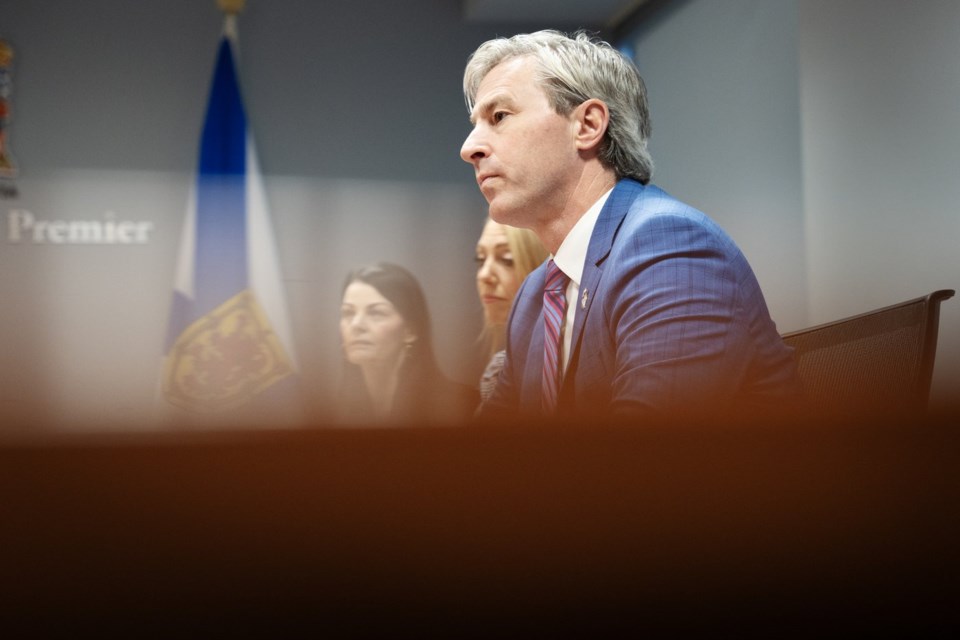HALIFAX — The Nova Scotia government wants Ottawa to reconsider a proposed pilot project that would redistribute the quota for commercial licence holders in the lucrative — and sometimes violent — fishery for baby eels.
In an end-of-year interview with The Canadian Press, Premier Tim Houston said he doesn’t think it's a good idea for the federal Fisheries Department to redistribute licences to people already working for commercial companies that harvest the eels, known as elvers.
“We just don’t agree," Houston said about Ottawa's proposal, which he called a shining example of the government's "inability to properly understand and manage the fishery. It’s been communicated to them that we are not a fan of what they are trying to do there.”
The elver fishery in the Maritimes has been tainted in recent years by drama and violence because of how profitable it is — the baby eels had reached market values as high as about $5,000 per kilogram in recent years.
Ottawa closed the elver fishery in March, citing confrontations and incidents of violence that had created an “immediate threat” to public safety. In 2023, the fishery was closed in April after reports of violence related to unauthorized fishing as well as accusations of assaults and even shots fired.
Under the proposed pilot allocation, the federal Fisheries Department is offering licences to 120 fishers currently employed by commercial licence holders, granting them 27 per cent of the overall quota. A further 1.5 per cent would be allocated to licences offered to 30 fishers who currently catch adult eels.
Meanwhile, as part of its quota allocations for 2025, the federal government offered about 50 per cent of the catch to Indigenous fishers.
If the proposal is adopted for the 2025 season, the nine commercial licence holders would be left with just under 22 per cent of the total catch, which has been held at 9,960 kilograms since 2005.
Houston’s office also released a letter sent to federal Fisheries Minister Diane Lebouthillier on Tuesday by provincial Fisheries Minister Kent Smith, who called the pilot project a “fundamentally unfair approach to fisheries management.”
Smith said that adding up to 150 new participants in the baby eel fishery would make it significantly harder to monitor and control illegal activities. Licence holders in Nova Scotia and elsewhere in the Maritimes have built their businesses over decades with the understanding that their licences and quotas “represent stable, valuable assets," he said.
“This proposal undermines that stability by signalling that quotas can be arbitrarily redistributed thereby creating uncertainty and eroding the confidence of participants across the industry."
The minister added that the reallocation of the quota would make it nearly impossible for banks and institutions such as the Nova Scotia Fisheries and Aquaculture Loan Board to provide financial support to the businesses.
“I urge you to reconsider this proposal and instead focus on policies that respect the contributions of existing licence holders,” Smith said.
The Fisheries Department was not immediately available for comment on Thursday; however in a Dec. 10 email the department said that the elver fishery has grown in value while requiring “relatively low input costs.”
“The commercial elver fishery presents a unique opportunity to broaden the distribution of the prosperity that can be generated among various types of harvesters, potentially including young harvesters, employees of existing commercial licence holders, and harvesters who participate in co-operative commercial enterprises,” the department said.
It said a feedback period on quota allocations to First Nations fishers was to end on Dec. 16.
“A final decision regarding the implementation of a pilot for new entrants to the commercial elver fishery for the 2025 season will be made by the minister in the new year prior to the opening of the fishery,” the department said.
This report by The Canadian Press was first published Dec. 19, 2024.
Keith Doucette, The Canadian Press




